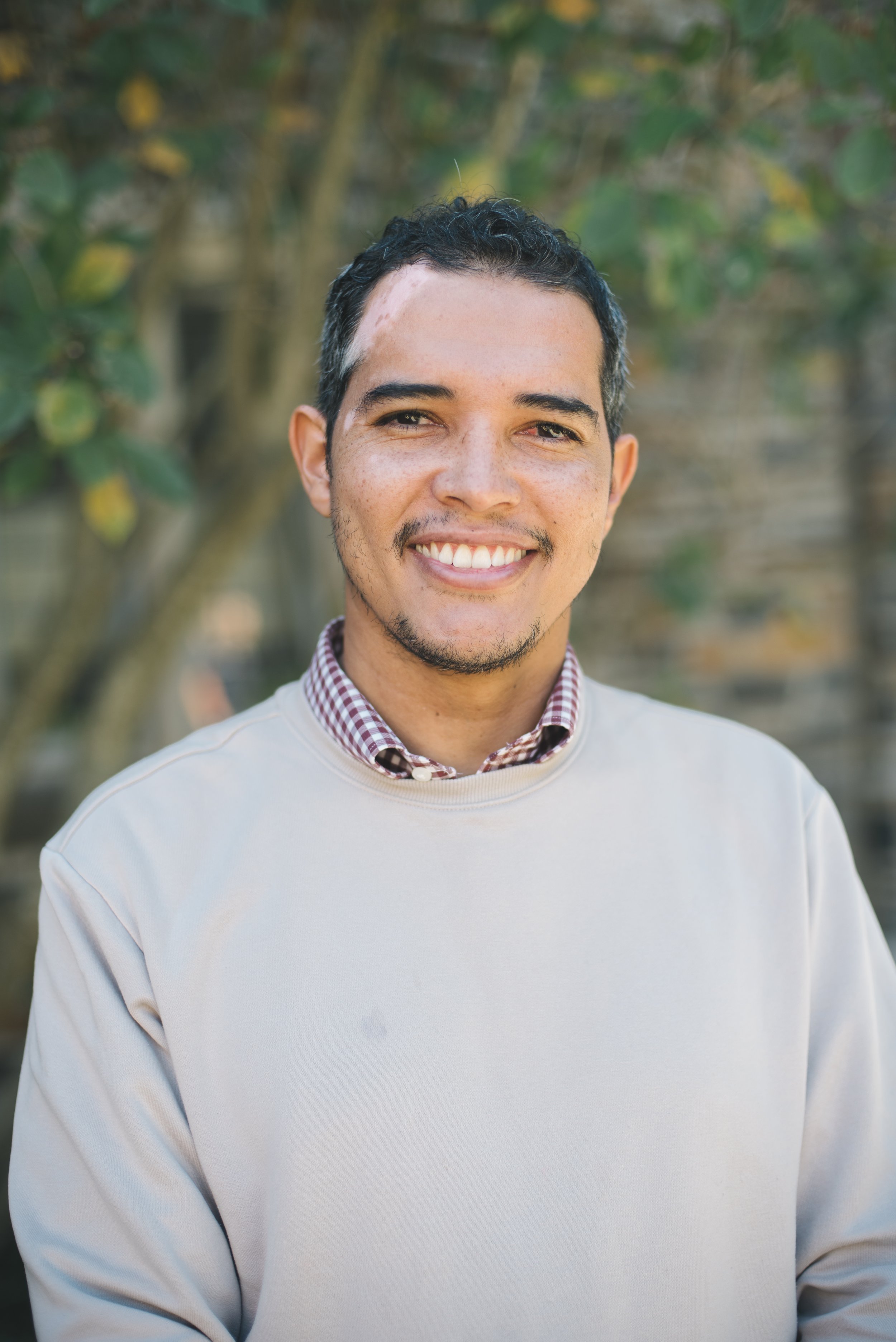Meet our Thriving Communities Fellows
Empowering Leaders
Hannah Doty Rochford
In the heart of the United Methodist Church’s Virginia Annual Conference, Hannah Doty Rochford can be found serving as a dedicated youth leader. A recent graduate from Randolph-Macon College, she joins the Thriving Communities Fellows, driven by the belief that leadership involves active engagement and attentive listening, fostering an equal partnership between the church and the community.
Reflecting on her journey as a youth leader, Hannah discusses the mission outpost Embrace Community Center in her conference. She says working with the community center has helped her understand how, "church cannot happen outside of community, [especially] for those not personally connected to the church." She says this after witnessing the ways in which missions can evolve beyond centering the four walls of the church meeting the community’s need. Describing this transformative journey, Hannah notes, " Rather than being isolated, I have been invited to see how I can be a leader of my congregation and be an advocate for my larger community."
With aspirations to be ordained as an elder in the UMC, Hannah's love for communion and her desire to make it accessible for all is the driving factor in the work she does. She sees communion as a tangible expression of the self-sacrificial love of Christ. Working with the Ormond Center has deepened her understanding of effective community engagement. Through the Place Making Lab, she gained confidence in addressing financial matters and resource allocation, skills she sees as necessary in the ongoing communal work she is doing.
Excited about the rich experiences awaiting her, she shares her aspirations for her time as a Thriving Communities Fellow, stating, "It [TCF] gives me access and a whole other level of church and community development in ways no one else can. All the resources are right here to empower me to be the best leader I can possibly be." As she looks forward to the future, Hannah has already forged meaningful connections with her cohort, showcasing the power of community in shaping her leadership journey.
Communion and Fellowship
Joseph Reigle
Joseph Riegle, a native of Binghamton, NY, has charted a distinctive path from city and regional planning at Cornell University and now entering his third year as an Mdiv student. As a member of the Anglican Church in North America (ACNA), Joseph reflects on his journey and envisions the impact of his vocation on healthy congregations and thriving communities.
In drawing parallels between city planning and pastoral leadership Joseph says, "It's not the leader's job to fix the community's problems; instead, it's about facilitating conditions for the community to find solutions.” This insight shapes his approach to ministry, emphasizing empowerment over solving problems, allowing congregations to articulate their unique vocations through Baptism.
He finds inspiration in Maximus the Confessor's words, "the Word of God wills that the mystery of his Incarnation be actualized always and in all things." This divine way of life, manifest in self-sacrificial love of neighbor, to him, aligns with the vision of the Thriving Communities Fellowship. Joseph sees theology not as an isolated field of study, but as an articulation of how Jesus's life transforms imagination, fostering true pastoral care and community shalom. Through Duke Divinity, he recognizes the unique role religious communities play in renewing imaginations and transforming desires, contributing to the love of neighbor.
Christian formation, both personally and within communities, is pivotal for Joseph. His participation in the Anglican Episcopal House of Studies at Duke, where daily prayers shape his spiritual growth, underscores the importance of prayer as essential to serving local communities.
Joseph's approach to cultivating intersectional partnerships is exemplified through his engagement with DurhamCAN, where cross-sector partnerships empower citizens for social change. In the Placemaking Lab at the Ormond Center, he witnessed how congregations reimagine their assets to promote flourishing in local neighborhoods.
The Thriving Communities Fellowship has provided Joseph with a valuable network of like-minded individuals, pastors, and experts. This network, he testifies, has enhanced his ability to contribute to the flourishing of communities through inspiration, advice, and prayer.
As he envisions his role in community revitalization, Joseph emphasizes the importance of responding to Christ's presence in the local community by building systems that promote the flourishing of all members.
Empowering Transformation
Yohan Alvarez
Hailing from Medellin, Colombia, Yohan Alvarez brings a rich background in political science to his journey at Duke Divinity School. Born into a Roman Catholic family, Yohan's spiritual journey took a turn in his youth when he began to participate in evangelical movements rooted in the Wesleyan tradition, ultimately, this journey helped him find a home in the United Methodist Church.
Yohan’s vision for transformative leadership is deeply rooted in his experience as a church youth pastor. In working with his young team, he pioneered a network of faith and non-faith-based youth associations with the goal to empower youth, enable social awareness, and encourage political advocacy. It is in this work that Yohan says he was able to articulate, “a theology that recognized the relevance of the social and civic commitment of the church as part of its missionary and evangelizing life.”
Motivated by Christ's compassion, Yohan sees his vocation as a divine call to care for the marginalized and contribute to, “the dignification of human life” allowing all to live out the messages of love and justice as demonstrated in Christ.
In his approach to community engagement, Yohan places intersectional partnerships and collaborative dialogues at the center of his work. Drawing from his leadership in the Youth Network, he emphasizes the need for collaboration among diverse stakeholders to achieve sustainable community change. To him, this ethos strongly aligns with the mission of the Ormond Center.
As a Thriving Communities Fellow, Yohan has found a platform that contributes significantly to his professional formation and builds relationships across denominational and institutional differences. For him, this program has enhanced his ability to contribute to community flourishing through the formation of church and religious leaders, fostering sustainable change through theological imagination, ministerial creativity, and effective partnerships.
Developing Culturally Competent Leaders
Jilian Palmer
A North Carolina Native, Jilian Palmer, embarked on a unique path, blending psychology with a Master of Public Health degree from the University of South Carolina. Her journey led her to a non-denominational church in South Carolina, where she found herself immersed in the intersection of faith and social justice.
Despite working in a non-denominational church, she proudly identifies herself as a National Black Baptist, emphasizing the importance of staying rooted in her cultural and religious background. In her quest for transformational leadership, cultural competency became a cornerstone.
When she reflects on her experiences in both academic and church setting she shares, "Cultural competency is key. Having the ability to develop language that is culturally sensitive is crucial." Recounting her involvement in cultural competency training at a previous church, she witnessed transformative shifts within communities, with the Holy Spirit acting as a catalyst in this work.
Though uncertain about the specific path of her future endeavors, Jilian envisions partnering with communities, whether through academic pursuits or ordained leadership. At Duke and within the Thriving Community Fellowship, she found a unique intersection where her passions and learning converged. As a TCF fellow, she is actively working with the Ormond Center through the Academy of Teaching, Training, and Learning to develop Bible studies aimed at encouraging churches to think critically and ethically about racial justice.
Her aspirations go beyond personal growth; Jilian envisions taking the knowledge and experience gained with TCF to creatively implement them in various spaces. She is driven by a desire to develop leaders who, in turn, empower others and extend their impact into the broader world.
Jilian's philosophy on community engagement aligns with her broader approach to discipleship. "Community engagement is not about going into a community and saving people; it's a reciprocal process of learning," she asserts. Recognizing the mutuality of the engagement, Jilian emphasizes that it's not about filling a void but about fostering collective growth.
As Jilian Palmer navigates her journey, she stands at the crossroads of faith, cultural competency, and community engagement––demonstrating the power of blending personal convictions with a commitment to transformative leadership. Her story unfolds as a testament to the potential for positive change when faith and cultural competency intersect in the pursuit of communal well-being.
Safe Spaces for Faithful Exploration
Macie Nantze
A lifelong resident of Oklahoma, embarked on a transformative journey of faith and leadership by joining the Thriving Communities Fellowship. Her passion for theology and ministry led her to the Master of Divinity program at Duke as she imagines transformative leadership within the Nazarene community.
"Transformative leadership, for me, begins at the pulpit," Macie remarks. "...fostering a place of honesty and community within the congregation itself." This commitment to openness was evident when a parishioner faced a severe brain cancer diagnosis. She notes how her pastor's candid admission of anger towards God created a space for genuine conversations and even allowed the congregation to use their building for support. Reflecting on her own tendencies, Macie admits, "A lot of my tendencies lean towards keeping things closed off. I am in a constant battle against the urge to store away emotions and thoughts."
Macie challenges the rhythm of Sunday mornings, advocating for a more active role of the congregation in the community. “Going to church on Sunday is not a compulsion; it’s a choice,” she states, emphasizing the broader responsibility of the church to engage with the community.
The work of the church, as Macie sees it, extends beyond four walls. Two years ago, her congregation took in 1000 refugees from Afghanistan through the Spero Project, highlighting the tangible impact that can be made when faith is put into action.
She stresses the importance of having difficult conversations about beliefs, acknowledging the myriad ways the church can engage with the community's resources. Macie believes in social and communal healing, asserting that the love of Christ plays a pivotal role, regardless of the church's involvement. “Social healing is inevitable, with or without the church. The question is, do we want to be part of that healing process?” she challenges.
Macie believes the Thriving Community Fellowship aligns perfectly with her vision. “TCF helps me see where the love of God is active beyond the four walls of the church,” she expresses, emphasizing the importance of healthy and safe conversations with people who hold different perspectives.





